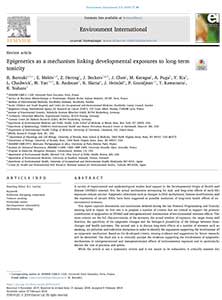 Barouki, R, E. Melén, Z Herceg, J Beckers, J Chen, M Karagas, A Puga, Y Xia, L Chadwick, W Yan, K Audouze, R Slama, J Heindel, P Grandjean, T Kawamoto, K Nohara. Epigenetics as a mechanism linking developmental exposures to long-term toxicity. Environmental International 114: 77-86 (2018). doi: 10.1016/j.envint.2018.02.014. [Epub ahead of print]. PMCID: PMC5899930 [Available on 2019-05-01].
Barouki, R, E. Melén, Z Herceg, J Beckers, J Chen, M Karagas, A Puga, Y Xia, L Chadwick, W Yan, K Audouze, R Slama, J Heindel, P Grandjean, T Kawamoto, K Nohara. Epigenetics as a mechanism linking developmental exposures to long-term toxicity. Environmental International 114: 77-86 (2018). doi: 10.1016/j.envint.2018.02.014. [Epub ahead of print]. PMCID: PMC5899930 [Available on 2019-05-01].
A variety of experimental and epidemiological studies lend support to the Developmental Origin of Health and Disease (DOHaD) concept. Yet, the actual mechanisms accounting for mid- and long-term effects of early-life exposures remain unclear. Epigenetic alterations such as changes in DNA methylation, histone modifications and the expression of certain RNAs have been suggested as possible mediators of long-term health effects of environmental stressors. This report captures discussions and conclusions debated during the last Prenatal Programming and Toxicity meeting held in Japan. Its first aim is to propose a number of criteria that are critical to support the primary contribution of epigenetics in DOHaD and intergenerational transmission of environmental stressors effects. The main criteria are the full characterization of the stressors, the actual window of exposure, the target tissue and function, the specificity of the epigenetic changes and the biological plausibility of the linkage between those changes and health outcomes. The second aim is to discuss long-term effects of a number of stressors such as smoking, air pollution and endocrine disruptors in order to identify the arguments supporting the involvement of an epigenetic mechanism. Based on the developed criteria, missing evidence and suggestions for future research will be identified. The third aim is to critically analyze the evidence supporting the involvement of epigenetic mechanisms in intergenerational and transgenerational effects of environmental exposure and to particularly discuss the role of placenta and sperm. While the article is not a systematic review and is not meant to be exhaustive, it critically assesses the contribution of epigenetics in the long-term effects of environmental exposures as well as provides insight for future research.

